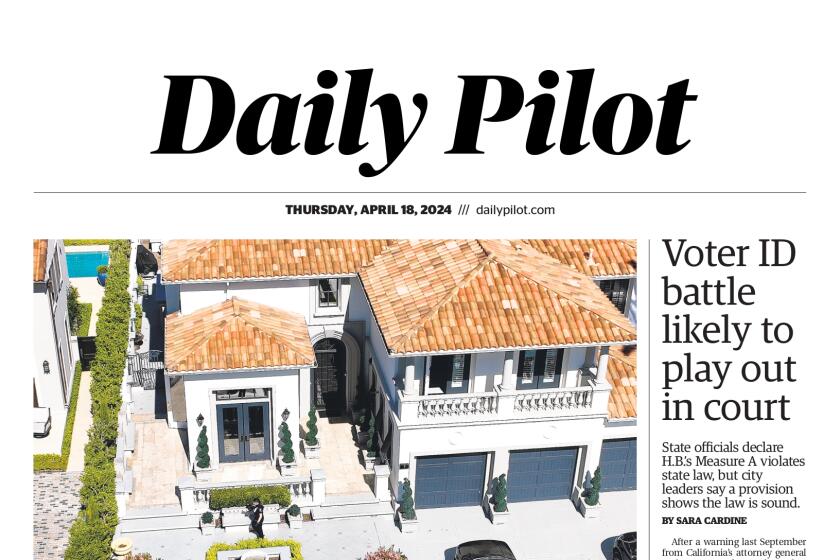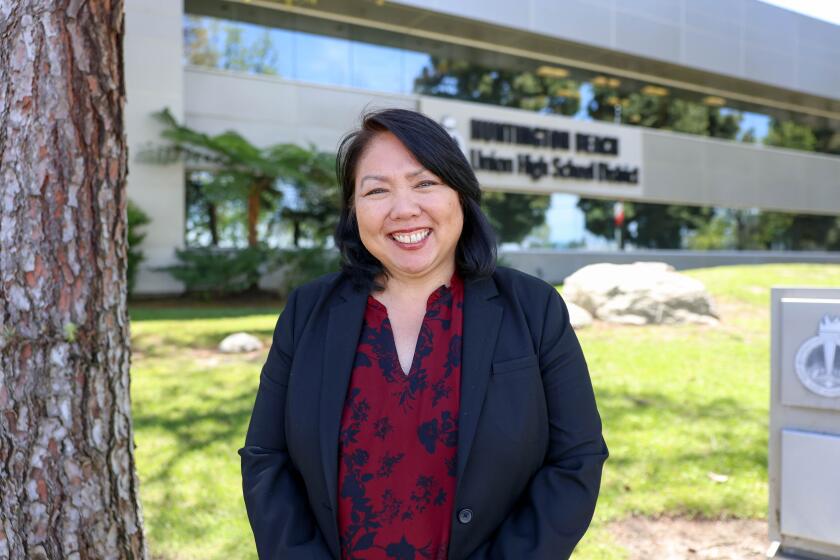H.B. repeals and replaces law forcing some downtown businesses to close by midnight
The Huntington Beach City Council voted Monday night to repeal and replace a 2013 resolution requiring downtown businesses that serve alcohol to close by midnight when they apply for or seek to amend a conditional use permit.
The vote was 5-1, with Councilwoman Jill Hardy dissenting and Councilman Billy O’Connell recusing himself because of business interests in the downtown area.
The replacement resolution makes several changes to the original, most notably allowing the zoning administrator, Planning Commission and City Council to approve exceptions to the standard conditions of the conditional use permit process, thereby shortening the procedure for requesting deviations. The original resolution allowed only the council to approve such exceptions.
In March, the council directed city staff to look into changing the resolution. Council members Mike Posey and Erik Peterson, who proposed the original item, said the rule might hurt downtown businesses.
In particular, the original resolution raised concern that it may keep businesses from applying to alter their properties because doing so might trigger the midnight closing requirement.
Posey said Monday that the new resolution would keep downtown businesses competitive by not penalizing them for trying to improve.
Hardy said she opposed the new motion because, for the sake of transparency, the council should be the only body to approve deviations. The council is monitored more by the public than the zoning administrator or Planning Commission, she said.
The new resolution also strengthens the city’s ability to revoke conditional use permits if conditions are not followed, according to a city staff report.
Councilman Patrick Brenden said it strikes the right balance between helping downtown businesses and granting the city the ability to regulate if things get out of control.
Energy program
The council voted 5-2, with members Lyn Semeta and Peterson dissenting, to enter an agreement with Southern California Edison to look into community choice aggregation, which can provide cities control over electricity rates and efficiency programs.
A CCA is a program for cities to buy or generate electricity for residents.
Peterson said he doesn’t like the idea of government being involved in the power industry.
“I don’t think it’s our role,” he said, adding that residents go to the council about things such as cleaning downtown or fixing streets rather than anything related to their power bill.
The council would need to enter a non-disclosure agreement with Edison to obtain customer energy use data to see whether a CCA would be economically viable for the city, according to a city staff report.
City Attorney Michael Gates said the non-disclosure agreement comes with some risk because it relies on broad language.
Several members of the public spoke about community choice aggregation.
Cari Swan said a CCA comes with huge risks and is an unnecessary expansion of government.
Michael Rotcher said he favors CCA and moving forward with the study to find out if the program is feasible in Huntington Beach.
Organic pesticides
The council heard a three-month update on a year-long organic pesticide pilot program.
The city started the project in the western portion of Central Park. Staff met with representatives of Irvine for insights on how that city’s organic pesticide program is working.
Pesticides are substances used to control pests or weeds.
Irvine and San Juan Capistrano have adopted organic-first pesticide policies. Last year, the Ocean View School District, based in Huntington Beach, stopped using the chemical herbicide Roundup, the main ingredient of which, glyphosate, the state classifies as a possible carcinogen. The Irvine and Newport-Mesa unified school districts stopped using it in 2015.
In a presentation Monday, city maintenance operations manager Denny Bacon said the city has narrowed its options to three.
The first is the continuous use of organic pesticides to mitigate weeds, which would cost about $1 million per year, Bacon said.
The second is to use Irvine’s model: manual labor for much of its weed abatement. As part of that plan, Huntington Beach wouldn’t use herbicides in parks but would use organic pesticides in rights-of-way. The plan would cost about $723,000 per year, Bacon said.
In the third option, the city wouldn’t use any chemicals and would manually eliminate weeds in all rights-of-way and parks, which would cost about $540,000 per year. Bacon said that is the safest program.
Several residents voiced support for a program that doesn’t use synthetic chemicals.
Dan Jamieson said it would be “terrific”to get anything potentially toxic out of city parks.
Tim Kowal, a board member for community group HB Tomorrow, started an online petition in late June calling for the city to end the use of synthetic pesticides. The petition had more than 340 signatures as of Tuesday morning.
The city will give another update on its pilot program in three months.
Twitter:@benbrazilpilot
All the latest on Orange County from Orange County.
Get our free TimesOC newsletter.
You may occasionally receive promotional content from the Daily Pilot.




